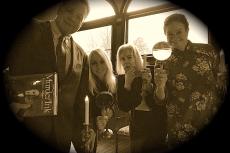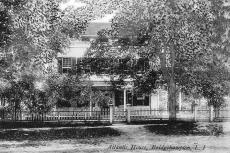Gov. Kathy Hochul signed legislation on Tuesday permitting Suffolk County to lease underwater lands previously ceded to it by New York State for the purpose of kelp and other seaweed cultivation.
The new law, co-sponsored by Assemblyman Fred W. Thiele Jr. and State Senator Todd Kaminsky, is intended to promote kelp aquaculture in Gardiner’s and Peconic Bays, helping to restore water quality and fish and shellfish habitat by reducing nitrogen pollution and strengthening natural ecosystems. It is also expected to bolster the growing seaweed-farming industry, providing economic benefits.
Sugar kelp cultivation is of growing interest on the South Fork and across Long Island. The species has multiple uses: as nutritious food for human consumption, as animal feed, as fertilizer, and as biofuel. But seaweeds also sequester carbon dioxide, countering ocean acidification caused by the absorption of carbon dioxide from greenhouse gas emissions.
Kelp is one of the fastest-growing plants in the world, second only to bamboo, and takes in five times more carbon than most land-based plants. It sequesters more carbon than eelgrass, mangroves, and salt marshes combined, based on biomass.
Industrial-scale cultivation of seaweed would complement shellfish aquaculture, as it grows from winter through spring, while shellfish farming is typically a spring-through-fall practice. Seaweed farming is the fastest-growing aquaculture sector, according to the National Oceanic and Atmospheric Administration.
Earlier this year, the East Hampton Town Board, on the recommendation of its water quality technical advisory committee, voted unanimously to allocate $14,660 to the town’s shellfish hatchery for development of a kelp hatchery and grow-out program.
Mike Martinsen, an oyster farmer and a town trustee, has grown sugar kelp in one of his aquaculture plots in Lake Montauk in conjunction with the Moore Family Charitable Foundation. The foundation plans to help small businesses gain expertise in seaweed cultivation for implementation in their products, or on their menus.
Sean Barrett, a co-founder of Dock to Dish, which delivers fresh seafood to its members, more recently launched Montauk Seaweed Supply. Earlier this year, it took its first delivery of kelp, which it converts to fertilizer, from New England.
“I have pursued the enactment of this legislation for years as studies have highlighted the benefits of kelp in removing nitrogen from our waters,” Mr. Thiele said in a statement issued on Tuesday. “The cultivation of this environmental and economically viable product will promote a growing industry that will help restore water quality and fish habitats on the East End while creating jobs for our traditional maritime businesses. I am excited that New York will now join other states that have already established kelp and commercial seaweed aquaculture programs. I thank Governor Hochul for signing this bill into law.”
In her own statement, the governor said that “Environmental conservation is an issue that is close to my heart and a key priority for my administration. The cultivation of kelp and other seaweed will help restore the health of ecosystems in these bays, promote the emerging aquaculture market, and support the local economy.”



